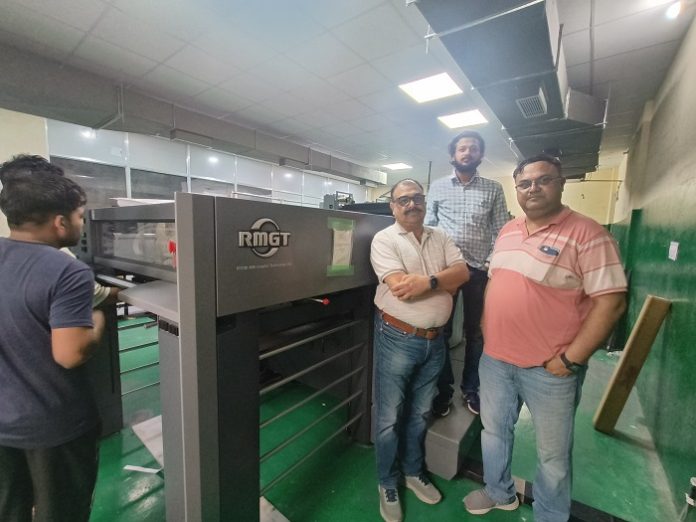
Meerut, a bustling city in western Uttar Pradesh some 80 km northeast of Delhi, was traditionally known for its knife and scissors industries. Over the years, this NCR ring city has itself become a hub of educational book publishing and printing as well as sports equipment manufacturing. Meerut currently has more than a hundred small and large book publishers.
The main reason for Meerut’s emergence as a book publishing and printing hub, apart from its proximity to Delhi, is the easy availability of designers, authors, and content writers for educational textbooks. At one time, Meerut’s publishers outsourced their book production to printers in Delhi and other areas of the NCR. But now the city’s publishers seem to have become self-sufficient in their production requirements, with many commercial printers developing their multicolor offset and automated binding capabilities over the past two decades. With many of the city’s printers looking to replace their used presses, anywhere from five to 10 new multicolor sheetfed offset presses come to Meerut each year.
One of these growing businesses is Palak Printers, starting operations in a 2,500-square-foot plot with a working area of 5,000 square feet on two floors, in Mangal Pandey Nagar. The neighborhood is named after the Indian soldier whose rebellion triggered a chain of events that led to the First War of Indian Independence – which the British naturally call the Sepoy Mutiny of 1857.
The family-owned commercial printing business is run by managing director Ashu Rastogi, his brother Sulabh Rastogi, and his son Shubh Rastogi, who are directors as well. The established and expanding company moved to a larger plot in the Mohkampur Industrial Area in 2017 where they have built up 35,000 square feet of working space on three floors. Palak produces the full complement of commercial print – books, notebooks, question papers, magazines, visiting cards, pamphlets, letterheads, and brochures.
Eighty percent of the work is for universities and colleges while the remaining 20% of production is for private publishers and commercial print. Palak Printers is an authorized printer for government institutions such as the NCERT, IGNOU, NIOS, the Delhi Board of School Education, Delhi University’s School of Open Learning, the education boards of the states of Rajasthan, Punjab and Uttarakhand.
Its private educational publishing clients include Rajluxmi Publication Meerut, Blueprint Education, Chitra Publication, Chitra Exports, Turning Point Publication, Ace Publishing House, Students’ Success Books, and Agarwal Publishing House, which is based in Khurja near Bulandshahr.
The company’s prepress operations include a Cron CtP, while the pressroom contains four multicolor Heidelberg offset presses including a 5-color SM102 and a Planeta Variant 4-color. In a move to the next level in terms of quality and efficiency, Palak Printers recently commissioned a new RMGT 920ST-4+CD 4-color press supplied by Provin Technos.
Ashu, Sulabh, and Shubh Rastogi are all praise for the new press, which has a compact footprint and excellent performance at much higher speeds than their earlier presses. They find a noticeable improvement in the quality and ease of operation.
Ashu Rastogi notes, “There is a lot of difference in the printing quality of used and new presses. The new RMGT 920ST-4+CD 4-color has a reduced machine footprint taking less space and consumes less electricity. Its automated and intelligent features mean less labor and much higher productivity. We plan to replace all our old printing machines with newer presses eventually.”
Palak Printers began its in-house binding operations in 2016, according to Shubh Rastogi. He explains that it currently has a large array of finishing and post-press equipment, including three Stahl folders installed in 2016 and 2017, a pair of Polar EM115 paper cutting machines, three Indian-manufactured perfect binding machines from Electromec, a Polygraph 3-knife trimmer, and three Amritsar Postpress automatic stitching machines.
The company relies on global ink manufacturers in the country such as Toyo Inks (now Artience), Sakata, and Hubergroup according to Shubh Rastogi. Its paper comes from Indian mills such as BGGPL, Naini, ITC, and DSG along with some imported coated papers.
The Indian climate is challenging as both high temperatures and humidity affect the ink, he said, adding sealed pack cabins with air conditioners are needed to make sure the presses and inks perform well. The commercial printer consumes 120,000 reams of paper annually printing 500,000 sheets daily. Sulabh Rastogi explains that the peak book printing season starts from mid-September lasting till May-end, adding that due to the large number of book publishers in the city, Meerut’s paper consumption is possibly equal to or even exceeding that of Delhi.
The limited season for textbook production presents a business challenge with printers having to move to other printing work such as brochures, pamphlets, and letterheads during the off-season from June to August. Fluctuation in the price of raw materials and paper is another pain point affecting imports while ink prices are directly proportional to petrol prices, explains Shubh. Though many printers face human resource issues due to a lack of skills and experience, the Rastogi family claims it is an exception as their business employs only well-trained, well-educated, and well-experienced staff for their print operations.
Ashu and Sulabh Rastogi share an interesting story on how the next generation joined the legacy print business. Shubh received a campus placement after completing his Btech degree. However, during the long gap between completing college and the date of joining, he visited the family’s printing plant and gradually developed a keen interest in printing. Today, he plays a key role, helping with updating the printing equipment, and overseeing the production and logistics.
Palak Printers exports books to Canada and Australia. Looking to expand its exports, the printer has booked a stand at the UP Government’s International Trade Show in Greater Noida from 25 to 29 September 2024.
















